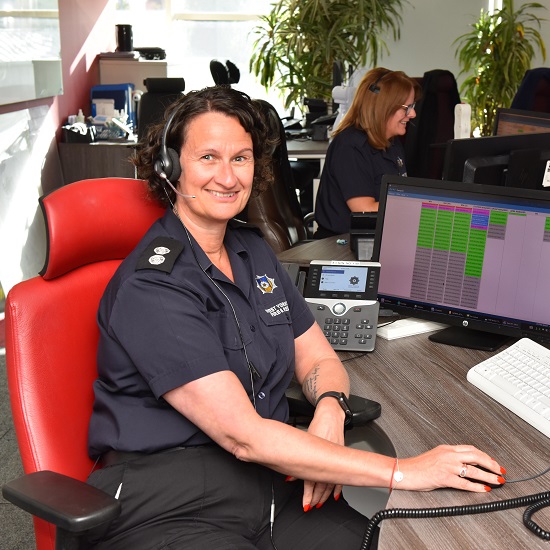
What does a control room operator do?
Every day is different in the control room at WYFRS. Your day involves taking numerous 999 calls and you must prepare yourself, as each one is different. Thankfully, with two years of training behind our operators they are all able to provide a calm and quick response to each incident – from a fire in the open to a road traffic collision.
People are often surprised that we not only take the 999 calls, but we also dispatch the teams to each incident. Other emergency services have separate departments for their calls and dispatch, but we have to multitask to generate the right response for each incident.
A big part of our job is incident management. We are on the line the whole time, giving survival guidance to the caller and monitoring the incident from the beginning to the very end. We also make sure that there is proper fire cover at each station every day and night.
What is the most challenging part of the job?
It could be when an incident escalates to make pumps 10, for example and trying to mobilise the right number of resources whilst still taking 999 calls. The best part of this though is that everyone within the control room pulls together as a team and shows their own strengths.
Around bonfire night is our busiest time and is always a huge test for us. The heatwave was one of the busiest times I’ve ever seen - at one time we had 20 pumps out at one fire and 15 out at another. In those situations the firefighters are able to focus on the fire they are dealing with, whereas we are covering both at the same time.
What are some of the most interesting calls you’ve dealt with?
We deal with such a wide range of situations from technical jobs such as rescues, to members of the public in life threatening situations.
Once we had an aircraft emergency at Leeds Bradford Airport, which turned out to be bringing the Leeds Utd team back from London - thankfully it was a minor emergency in the end. We do have some sad calls as well. However, one of us took a call recently from a man who had just been released from prison and wanted to “end it all”. We were able to have a conversation, make him calmer and give advice that helped. This gives us such a rewarding feeling.
We have to picture in our heads what is happening, and sometimes that’s worse than the reality. What helps is when the crews come to see us afterwards and tell us exactly what happened and how an incident ended, it helps give us closure.
What sort of person would be best suited to a job in control?
When new recruits join us they ask what qualities you need to be an operator – the first ones that spring to mind are calm, quick-thinking and able to multi-task. You need to be someone who can follow instructions, be organised and willing to learn.
Every day is a school day in the control room and new things happen or change - you have to stay open minded and compassionate. Being able to multitask and listening to a caller while mobilising a crew is important. Finally you need to able to tune out some of the worse incidents and think of the good ones.
What would people be most surprised to hear that you deal with?
Rescuing as many animals as we do. Dogs fallen down cliffs or stuck in fox holes, cats behind walls, horses that cannot get on their feet and cows in mud.
Possibly also the amount of times we are called by other services, such as police and ambulance. We get a surprising number of calls from ambulance crews needing to gain entry to properties where patients need them.
What is the best part of the job?
One of the main things is the relationship with your team. Also, because you are involved in a call from start to finish it’s good when you have a positive outcome – knowing a pet was saved and that we’ve let ambulance crews in to help an elderly lady who had been lying helpless on the floor.
Another big plus is the work-life balance. You work hard when you are on duty, but the rewards certainly outweigh this as due to our shift patterns when you book four days holiday you get 12 days off!
What is the training like?
Control room operators do an initial eight weeks training course, when they are on trainee pay. Then they have two years where they develop their skills. We receive training on a wide range of things from wild fires and terrorist attacks to business continuity and working with the police and ambulance crews.
During those years staff are on development pay and then, providing they have met all the requirements, they go onto full pay. It is such a rewarding job – every day I walk into work singing, so that has to be a good sign.
For more information on becoming a control room operator visit www.westyorksfire.gov.uk/control-operators